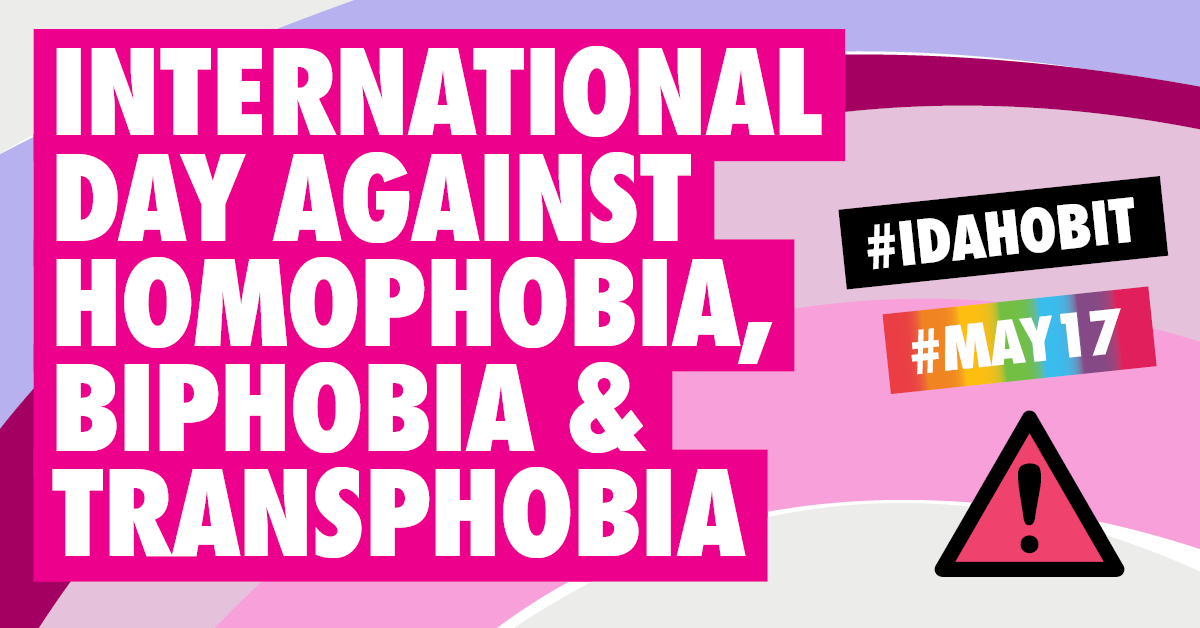Why do we need an International Day against Homophobia, Biphobia and Transphobia?

Content warning: discrimination, mentions of death and abuse.
Today is IDAHOBIT, or International Day Against Homophobia, Biphobia and Transphobia.
Founded in 2004, this aims to raise awareness of violence and discrimination against LGBTQ+ people to drive positive change, and is now celebrated in more than 130 countries around the world.
IDAHOBIT reminds us that there is still a long way to go until all LGBTQ+ people are free and safe from harm. Here are some reasons why it is still needed in 2021, and ways you can help:
1. Poland
In Poland, anti-LGBTQ+ rhetoric has become widespread in recent years, stoked by President Andrzej Duda, who recently stated that LGBTQ+ people are an ideology ‘even more destructive’ than communism and pledged to ban the propagation of this ‘ideology’ in public institutions.
More than 80 local governments in Poland have declared themselves ‘LGBT-free zones’
More than 80 local governments in Poland have declared themselves ‘LGBT-free zones’, pledging intolerance of LGBTQ+ people and banning LGBTQ+ events.
This government campaign fuels hatred and fear of LGBTQ+ people amongst Poland’s wider population: in a 2019 survey, when asked what they thought was the biggest threat facing them, the most popular response amongst Polish men under 40 was ‘the LGBTQ+ movement and gender ideology’.
How to help: You can donate to support the work of the Polish charity KPH (Campaign Against Homophobia), which works nationwide to advocate for LGBT people and distributes funding to smaller grassroots organisations.
2. Brazil
Brazil’s President Jair Bolsonaro has attacked what he calls ‘gender ideology’, has openly stated that he would rather his son die than be gay, and has advocated physical abuse of LGBT children.
Brazil has been ranked the deadliest country for trans people.
Brazil has been ranked the deadliest country for trans people, with 175 trans women murdered in 2020 alone. Indianare Siqueira, a trans woman activist and politician in Rio de Janeiro, told Stonewall that ‘trans people in Brazil live in a context of total abandonment by a society that attacks and kills us’.
During Bolsonaro’s 2018 election campaign, two trans women were killed in attacks where attackers used Bolsonaro’s name. With more elections next year, campaigners are concerned that this violence will intensify further.
How to help: CasaNem, Grupo Arco-íris, and Pela Vidda are all grassroots organisations working on the ground with trans people in Brazil, and all are currently accepting donations.
3. Hungary
Hungary’s far-right ruling party Fidesz has signalled its intention to change the constitution to defend so-called ‘Christian values’. They recently banned the legal recognition of trans people and LGBT people from becoming parents.
How to help: There are numerous Hungarian organisations working to support LGBTQ+ people, such as the Hungarian LGBT Alliance, Háttér Society, and Transvanilla Transgender Association, all of which welcome donations and support.
4. Chechnya
Since 2017, at least 100 men have been targeted and detained by police on suspicion of being queer, and three have been killed. Chechnya’s leader, Ramzan Kadyrov, has been described as waging a “blood-cleansing operation” to eliminate all LGBT people’, and has been defiant in the face of international condemnation, claiming that there are no LGBT people in Chechnya.
While queer men have been the primary targets of these ‘gay purges’, queer women are also subject to coercion and abuse from families and in healthcare settings, such as in the government-linked Boyev’s Clinic, which provides ‘psychiatric treatment to those rendered unfit to the Chechen society’. Data is not available for non-binary people, but it is likely they would also experience intolerance and abuse.
How to help: You can donate to support the work of the Russian LGBT network, which has successfully evacuated over 100 LGBT people from Chechnya through its Rapid Response programme.
5. UK
It is easy to see homophobia, biphobia and transphobia as something that happens ‘elsewhere’ but IDAHOBIT prompts us to look closer to home, too.
Transphobia is so prevalent in the UK that in 2017 a trans woman was granted residency in New Zealand because of the persecution she suffered here.
Transphobic hate crimes have quadrupled in the last five years.
Transphobic hate crimes have quadrupled in the last five years, with 4 out of 5 trans people experiencing a transphobic hate crime, and 1 in 4 experiencing physical assault or the threat of physical assault. Some UK media outlets frequently carry articles by anti-trans hate groups that are active in seeking to undermine trans people’s rights.
The number of homophobic attacks is also increasing, with data suggesting that these have risen by 22% in London in the space of one year.
One of the women subject to a homophobic attack on a London bus in 2019 linked her attack to an ‘open season on the bodies of… people of colour, indigenous people, transgender people, disabled people, queer people, poor people, women and migrants’, and called on people to ‘stand up for yourselves and each other’.
How to help: You can support Stonewall’s work fighting for LGBTQ+ acceptance, by donating or signing up for our newsletter.
This year we’re also amplifying the voices of LGBTQ+ people in the UK and internationally in partnership with TikTok: visit our channel to view and share.

